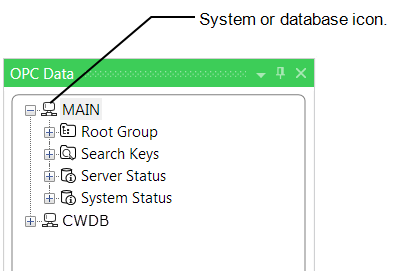The OPC standards are a series of standard specifications aimed at allowing interoperability between different SCADA systems. Geo SCADA Expert uses these standards to allow transfer of data between the Geo SCADA Expert server and third-party applications. To help facilitate this, Geo SCADA Expert stores property values in the database in the form of OPC tags.
If your User Account provides access to this particular Explorer Bar, you can use the OPC Data Bar to access the OPC Data Access (OPC DA) properties (‘tags’) of various items in the database.
The OPC Data Bar displays the entries in a hierarchical tree structure.
At the top-most level is the System or Database icon. If a ViewX client provides access to Multiple Databases, ensure that you expand the branch of the System in which you are interested, in order to access the properties that apply to that particular database.

The next level of the tree structure comprises the following:
- Root Group—Use this branch to access the OPC Data Access properties of items that are configured in the database (see Access Property Tags).
- Search Keys—Use this branch to access the OPC Data Access properties of any ‘custom’ string fields that have been added to any of the database tables (see Access Search Key Tags).
- Server Status—Use this branch to access to a selection of the OPC Data Access properties that relate to the status of the server to which the ViewX client is currently connected (see Access Server Status Information).
- System Status— Use this branch to access to a selection of the
OPC Data Access properties the relate to the system's status, including the status of other hot-standby servers on the system (see Access System Status Information).
The Register Spaces branch is only supported by the server for specific applications.
You can use OPC Tags in expressions in various parts of Geo SCADA Expert—see Welcome to the Guide to Expressions. For further information on OPC Tags and for information on other ways of accessing such tags, see OPC Tags.
Further Information